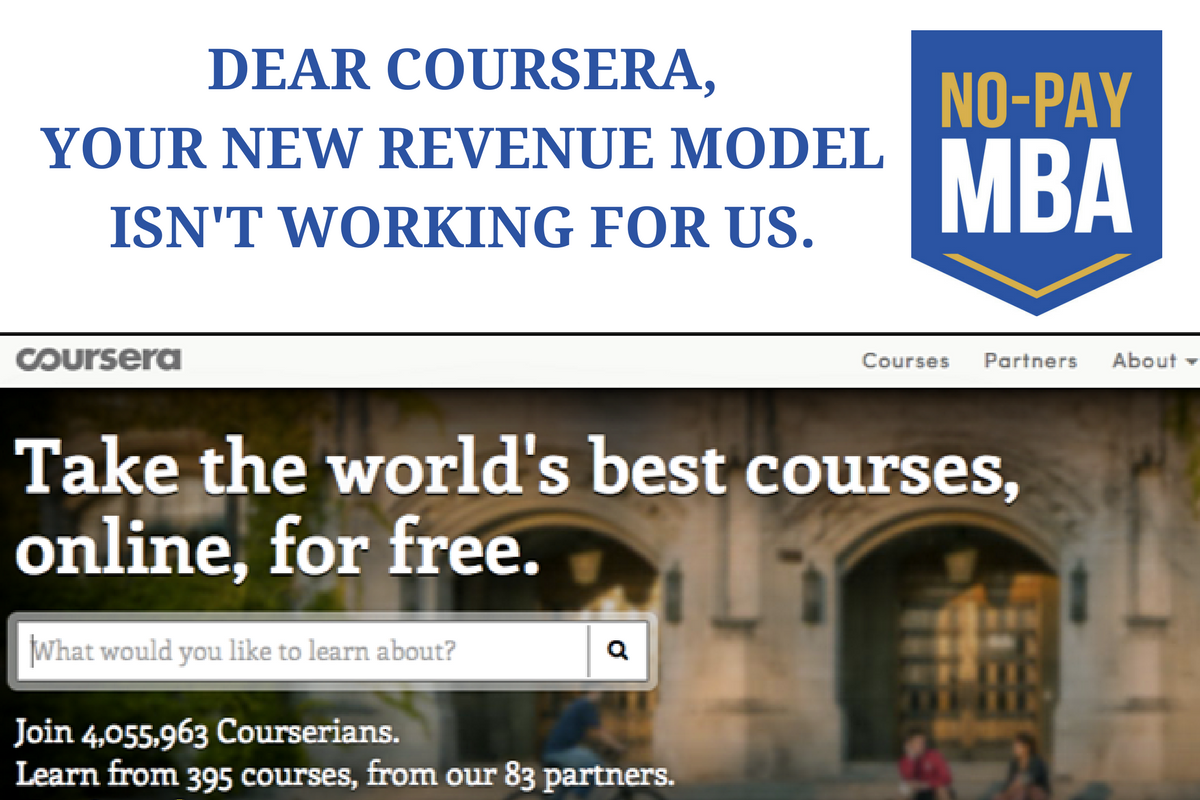
Dear Coursera,
Let me start by saying that I love what you do. Having used MOOCs to put together a business education equivalent to an MBA, and now as someone who gives advice and guidance to people seeking high-quality, debt-free business education, I am a major proponent of your work.
Which is why I feel compelled to say something about your newest revenue model, in which you charge students for access to quizzes and assessments.
Since this is an open letter, let me break it down for people who aren’t as intimately familiar with your services as I am. Coursera offers massive open online courses - MOOCs - taught by university professors from well-respected institutions of higher learning. At first, these courses were totally free, including a certificate if you finished a course. Then Coursera started offering identity-verified certificates for a fee, and gradually free certificates were phased out. Most recently, Coursera has adopted a new model in which it is still possible to watch course videos for free, but users must pay a course fee in order to access quizzes and assignments.
Coursera, I understand that you need to find a way to earn money. After all, it is expensive to create and deliver university courses, even online. But this latest model feels like a big step toward the closure of a resource that was so exciting precisely because it was radically and truly open.
When MOOCs first appeared, they seemed almost too good to be true. It was thrilling to be part of such a bold experiment in higher education. What would happen if everyone in the world were able access courses taught by the brightest minds on the planet? Would people be interested in free university courses? (Yes.) Would they find value in the courses? (Big yes.) Would employers recognize the additional knowledge and skills being transferred through MOOCs?
The answer to this last question is still unknown. And in chipping away at the foundation of free-ness upon which MOOCs were initially built, you’re making it more risky for us to try to find out. You’re also facing a PR problem, as even die-hard MOOC fans begin to question whether pseudo-free courses, where the assignments are hidden behind a paywall, are as exciting as truly free ones.
Rather than gradually closing off your courses, what about focusing instead on value-adding products and services that can complement them?
I’ll continue recommending Coursera courses to readers of the No-Pay MBA blog. You continue to have the biggest and best catalogue of business courses around. But I’m disappointed by the incremental reductions in offerings that were once available for free. And I’m not the only one who feels this way. I am writing this letter on behalf of the MOOC students in my community, many of whom have expressed their frustration in our community discussion forums.
I have to wonder, rather than gradually closing off your courses, could you instead focus on value-adding products and services that can complement them?
I would be excited to recommend to my readers the following course add-ons, some of which you are already piloting:
- Mentorship. One of the big criticisms of MOOCs is that completion rates are low. Your new mentor-guided courses seem like a great way to boost motivation, keep people on track, and give them a way to form the kinds of relationships that make in-person education so transformative.
- Assignments graded by experts. Rather than charge for computer-graded quizzes and peer-graded assignments, why not add assignments that are graded by professors, graduate students, or industry professionals? Additional assignments, for which students receive feedback from subject matter experts could be highly valuable.
- Industry connections and job placement. Not everyone who takes a MOOC is looking for a new job. And that’s fine. In fact, that is what’s so wonderful about these courses. They allow people to explore. But for those who are not just tourists in the world of online education, the big value is in bridging the distance between where they are professionally and where they want to be. And that means making connections with industry. You’ve already started working on this with industry-designed capstone projects. Why not help some of the top MOOC performers get interviewed by top companies and then charge a recruiter’s fee if they end up getting a new job placement?
These are just a few ideas of how you could boost your revenues without alienating your current base. You won our gratitude and our admiration with free courses. You can keep it by building additional value on top of them, without taking away what made us love you in the first place.
Sincerely,
Laurie Pickard
Founder, No-Pay MBA



